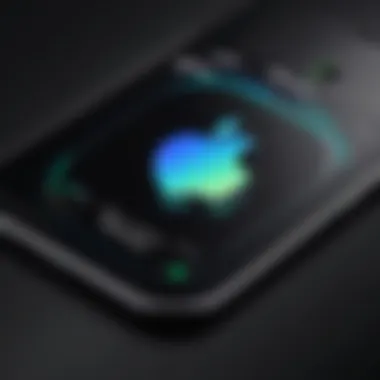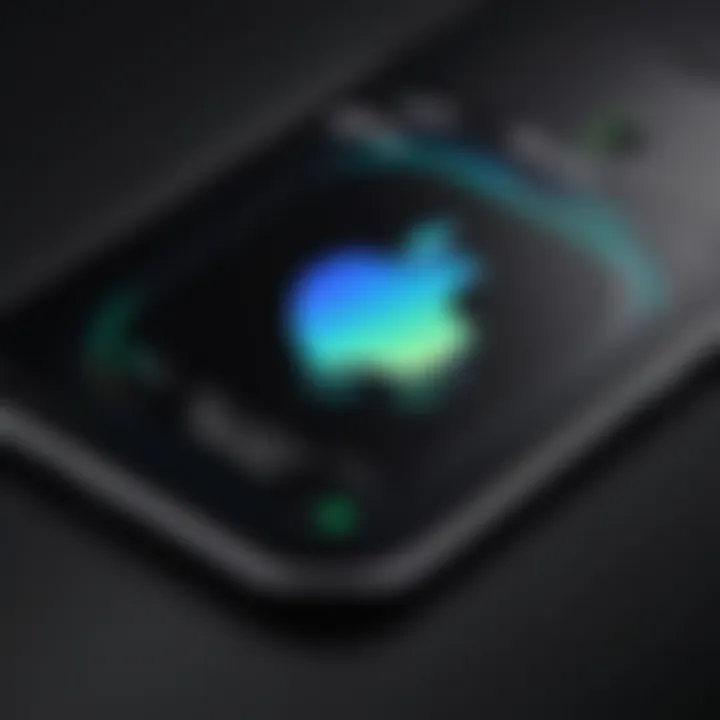Understanding Apple VPN: Benefits and Functionality


Intro
In a world where safeguarding your online presence is paramount, understanding how Apple VPNs function is essential. Every click and connection can unveil a slew of potential vulnerabilities, which is why many tech-savvy users and casual surfers alike turn to virtual private networks to fortify their defenses.
Apple VPNs are specifically designed to encrypt your internet connection, ensuring that your personal information remains just that—personal. Unlike traditional methods, these VPNs offer a streamlined, user-friendly experience on Apple devices. Whether it's your iPhone, iPad, or Mac, Apple VPNs enhance not only privacy but also the overall online experience.
In this article, we will take a closer look at the core functionalities of Apple VPNs, their integration within Apple's ecosystem, and the diverse benefits they provide. We'll also tackle some potential drawbacks and share user experiences to give you a rounded view of what to expect should you choose to jump aboard the Apple VPN bandwagon.
Intro to Apple VPN
The digital age has brought about a myriad of opportunities to connect and communicate, but it has also ushered in a host of privacy concerns. This is where Apple VPN comes into play. Understanding what it does and how it can benefit users is essential in today’s technology-driven world. Not only does it serve to protect users, but it also enhances the overall online experience. In this section, we’ll dissect the importance of Apple VPN, unraveling the elements that make it a cornerstone for security and privacy.
Definition of VPN
A VPN, or Virtual Private Network, acts as a secure tunnel between your device and the internet. Picture it as a secret passageway that hides your online activities from prying eyes. Essentially, when you connect to a VPN, your internet traffic is routed through a server operated by the VPN provider. This not only helps in encrypting your data but also masks your IP address, making it harder for anyone to trace your online movements back to you.
VPNs serve many functions: they allow access to restricted content, provide a layer of anonymity, and protect data from unwanted surveillance. Imagine being in a café, sipping on your favorite brew, while the person next to you is trying to sniff your data; a VPN significantly reduces this risk. The definition isn’t just limited to technical terminology; it’s rather a promise of safer internet practices.
Overview of Apple VPN
Apple VPN is integrated into the Apple ecosystem, reflecting the company’s commitment to user privacy and online security. Unlike many other VPN offerings, it’s not just a feature; it’s a built-in service designed to work seamlessly with Apple devices such as iPhones, iPads, and Macs. Due to this native integration, users can easily configure and manage their VPN settings without going through additional software.
Apple VPN employs various protocols like IKEv2 and L2TP, ensuring robust security for data in transit. With generous emphasis placed on encryption, it means your sensitive information – whether it's personal emails or banking data – is shielded from cyber threats.
Moreover, the overall performance of Apple VPN is crafted to align with the high standards of Apple’s ecosystem. That means less hassle and more peace of mind while browsing, streaming, or working on the go. Apple has capitalized on its reputation for user-friendly design, making it accessible for anyone regardless of their technical prowess. This makes understanding Apple VPN not just important, but necessary in the current landscape of digital communication.
Core Functions of Apple VPN
When it comes to online safety, the core functions of Apple VPN serve as the backbone of its technology, addressing various needs of the user. These functions are vital not just for casual web surfers, but also for tech-savvy individuals who value privacy and seamless interaction across devices. Let’s break down the specific elements that underscore its significance in today’s digital world.
Data Encryption
Data encryption is a fundamental aspect of Apple VPN. Essentially, it ensures that any data you send or receive while connected to the VPN is well-protected from prying eyes. This is especially crucial when using public networks like those at cafes or airports, where hackers often lurk.
Encryption works by changing your readable data into a coded format, rendering it incomprehensible without the right decryption key. Apple's implementation of strong encryption protocols safeguards sensitive information such as passwords, personal data, and communications. This process not only enhances user security but also boosts confidence among users, fostering a safer browsing environment.
Data encryption is akin to sending a postcard in a locked safe; no one can read it unless they have the key to the safe.
IP Address Masking
IP address masking is another key function of Apple VPN, providing users with a level of anonymity that’s often hard to achieve online. When you connect through a VPN, your real IP address gets hidden, and instead, the VPN server’s IP address is displayed. This makes it difficult for websites and other entities to track your online activity.
This feature is particularly valuable when accessing geo-restricted content or when you prefer to remain anonymous online. By masking your IP, you can sidestep annoying targeted ads and even access services that otherwise may be blocked in your region. This not only encompasses freedom on the internet but also minimizes the risks of being identified simply due to your browsing habits.
Secure Remote Access
With more people working from home or on the go, secure remote access has gained prominence. Apple VPN provides a reliable way for users to connect to their home or work networks securely. It allows them to access files or internal systems safely, without leaving their data vulnerable.
This functionality is particularly crucial for businesses that rely on sensitive customer information or proprietary data. By facilitating secure connections, Apple VPN helps companies protect their digital assets while allowing employees the flexibility to work from various locations. Furthermore, it eliminates concerns about data breaches during transmission, ensuring that sensitive information remains under wraps.
How Apple VPN Enhances Privacy
In the ever-evolving landscape of digital privacy, Apple VPN plays a crucial role in ensuring that users maintain their confidentiality while navigating the internet. The push for online privacy has intensified in recent years, driven by an increasing awareness of data breaches, surveillance, and intrusive advertising practices. Apple’s commitment to privacy is not just a buzzword; it is embedded in the functionality of its VPN service. Through its various features, Apple VPN specifically tackles two of the most pressing issues faced by users today: protecting personal information and preventing data snooping.
Protecting Personal Information
The core of any VPN’s service is in its ability to protect your personal information, and Apple VPN excels in this area. When you connect to the internet, whether it’s through a coffee shop’s Wi-Fi or your home network, your personal information can be exposed to various third parties. This includes not only your IP address but also the data you transmit online.
- Data Encryption: Apple VPN encrypts your internet connection. This means that the information you send and receive gets scrambled, making it unintelligible to anyone who might intercept it. This encryption safeguards essential details like passwords and banking information, keeping your sensitive data safe from prying eyes.
- IP Address Concealment: By masking your original IP address, Apple VPN provides a layer of anonymity. Websites and online services cannot track your browsing habits as they see only the VPN server's IP address. Thus, your digital footprint becomes much harder to trace back to your identity.
- Secure Protocols: Apple VPN utilizes secure tunneling protocols, which ensure that your data travels safely through the internet. These protocols further prevent data leaks, allowing users to feel more secure when accessing sensitive content online.
The benefits of protecting personal information with Apple VPN extend beyond just a sense of security; they also foster a more honest communication environment, whether you are sharing sensitive documents or engaging in personal conversations.


Preventing Data Snooping
In an age where government surveillance, corporate data collection, and cybercrime are rampant, Apple VPN offers users essential tools to thwart data snooping attempts. With its robust security features, users can navigate the online world without the constant worry of being watched or monitored.
- Public Wi-Fi Protection: One of the most significant vulnerabilities arises when using public Wi-Fi. Hackers often lurk on open networks, waiting for unsuspecting users to connect. Apple VPN encrypts your connection even on these unsecured networks, preventing hackers from accessing any of your data.
- Data Integrity: By actively securing your connection, the Apple VPN maintains the integrity of your data. Users can communicate and operate freely without fearing that their information will be altered or intercepted. This is particularly vital for professionals handling sensitive work-related communications.
- Legal Compliance: By aligning itself with privacy laws and regulations, Apple reinforces the commitment to user privacy. This ensures that Apple VPN users can enjoy their privacy without the worry of legal repercussions that often arise from data breaches or misuse.
"Maintaining privacy in a digital world is akin to finding a needle in a haystack. Apple VPN works to make that search far less daunting.
Overall, Apple VPN’s design prioritizes user safety, making it a reliable option for anyone keen on keeping their information safe from data snoopers. By employing technological measures that protect personal information and prevent unwanted scrutiny, Apple believes in empowering users to take control of their online presence.
Integration with Apple Ecosystem
Apple's commitment to a seamless user experience is evident in how it integrates its VPN solution within its ecosystem. Understanding the integration of Apple VPN with its devices and services adds a layer of appreciation for what the technology offers. For tech-savvy users, this means not just enhanced privacy, but also the convenience of using a solution designed to work uniformly across various Apple products.
Native Support in Apple Devices
Apple's ecosystem spans a range of devices including iPhones, iPads, and MacBooks. One of the standout features of the Apple VPN is its native support within these devices. Setting up a VPN on an iPhone or iPad involves simple steps through the device's settings. This built-in capability means users can quickly secure their internet connection without needing third-party software, making it remarkably user-friendly.
Moreover, this native support ensures that the features of Apple VPN align closely with the operating system's updates. When Apple pushes a new iOS or macOS version, VPN performance and security are often enhanced without the user needing to lift a finger.
For those using a MacBook, connecting to the VPN is just as straightforward, allowing for a hassle-free experience whether browsing casually or handling sensitive information. The interface remains consistent across devices, allowing users to easily switch between their iPhone and MacBook without adjusting to new software.
Compatibility with Software Services
Furthermore, Apple VPN boasts an impressive level of compatibility with various software services. Unlike some VPNs that may experience issues with streaming services, Apple's integration with devices like Apple TV means users can stream content securely and freely.
By utilizing the VPN, users can bypass geo-restrictions, allowing access to libraries and content that might otherwise be unavailable in their region. This is particularly beneficial for users who enjoy international Netflix shows or wish to use services like BBC iPlayer, where content access is often limited.
Moreover, when combined with Apple's iCloud, users can ensure their personal and financial information remains secure across every app and service hosted in the Apple ecosystem. The effortless connection means that whether you're sending documents via Mail or browsing with Safari, your data remains obscured from potential threats.
The integration of Apple VPN reflects Apple's larger strategy to create an ecosystem where security and convenience go hand in hand.
User Experience with Apple VPN
When it comes to technology, user experience can make or break adoption. Apple VPN is no exception. The user experience relates directly to how users perceive and interact with the VPN service. A good VPN should not only provide robust protection but also be easy to set up and efficient during use. As such, understanding the nuances of Apple VPN from the standpoint of user experience reveals critical insights into its functionality and reliability.
There are several elements that play pivotal roles in determining one’s experience with Apple VPN. Let’s get into it.
Setup Process
The setup process for Apple VPN is designed with simplicity in mind. Apple has a reputation for creating intuitive interfaces. New users generally find the onboarding straightforward. To get started, users navigate through their device’s settings. Current Apple devices offer built-in configurations that allow individuals to connect to VPN servers seamlessly.
- Steps to Set Up:
- Go to Settings on your device.
- Tap on General, then select VPN.
- Choose Add VPN Configuration.
- Select the type of VPN you wish to configure (IKEv2, IPSec, etc.).
- Enter the server information, remote ID, and authentication details.
- Save your configuration.
Once configured, users can easily toggle the VPN connection on or off, simplifying the everyday use. The ease of installation on devices like the iPhone or MacBook makes it appealing especially for less tech-savvy individuals who may shy away from more complicated services.
Moreover, the modern interface combined with clear instructions fosters confidence, allowing users to easily understand what they are doing without constant support. Hence, installation is not a daunting process, contributing positively to the overall user experience.
Usability and Performance
Once the VPN is set up, the actual usability and performance become apparent. Apple VPN aims to provide a stable and reliable connection. Performance can be influenced by a number of factors including connectivity, server load, and local conditions. Users tend to appreciate an interface that interacts smoothly without lag, ensuring that their online activities happen seamlessly.
- Connection Stability: Users often report robust connectivity, with fewer drops compared with some competitors. This is particularly vital when streaming content or working with sensitive data.
- Speed Considerations: Speed may vary depending on the server chosen and current traffic conditions. Still, Apple typically optimizes its infrastructure to ensure the impacts on speed are minimized.
- Accessibility: Apple’s ecosystem shines through here as well. Those using multiple devices can enjoy the same level of performance whether connecting with an iPhone or a Mac.
To bolster the experience, compatibility with Apple’s other services, like iCloud, can enhance usability further. The seamless integration creates an impression of a well-oiled machine, reassuring users that their data is not just secure, but also readily accessible.
Completing the circle of user experience is how these aspects come together for the user. Ensuring a frictionless experience from setup to daily use positions Apple VPN as a strong contender in the VPN marketplace.
"A good user experience is not just about having a beautiful product; it’s about making the product effortlessly usable."


Use Cases for Apple VPN
When it comes to Apple VPN, we can't ignore the multitude of practical uses that enrich a user's online experience. It's not just a gimmick; the VPN comes into play often when people seek better security or access to restricted content. Delving into use cases for Apple VPN sheds light on how it fits seamlessly into the digital lives of its users.
Streaming Content
Streaming services are all the rage nowadays, but geographical restrictions can put a damper on your binge-watching plans. Apple VPN's ability to mask your IP address makes it a handy tool for any avid streamer hoping to access a wider variety of content.
For instance, imagine you're in a region where a popular show is unavailable. With the right VPN connection, you can appear to be in a different location, fooling the streaming service into giving you access. Services like Netflix, Hulu, or BBC iPlayer have specific libraries based on where the users are located. By navigating with an Apple VPN, not only do users get to unlock a treasure trove of movies and series, but they also enjoy smoother streaming experiences, untouched by buffering that often comes with high-traffic periods.
- Enhanced Content Access: Gain entry to libraries of shows and movies not available in your area.
- Improved Streaming Quality: Bypass throttling often imposed by ISPs during peak times.
- Security: Keep your data private while enjoying your favorite shows.
"With Apple VPN, I can watch a show from the UK while I'm lounging in my living room in the States! It truly expands what I can watch!"
Safeguarding Public Wi-Fi Connections
Public Wi-Fi connections are a double-edged sword. While they offer convenience and often save on mobile data, they also present security risks. Let's face it, the last thing anyone wants is to be hacked while sipping coffee at a trendy café. Here’s where Apple VPN shines brightly.
Using a VPN while connected to public Wi-Fi adds a robust layer of protection. It encrypts your data, making it nearly impossible for cyber criminals to intercept any sensitive information flowing across the network.
Consider this scenario: You’re at a coffee shop, catching up on work emails over free Wi-Fi. If you don't have a VPN, all that information is floating around in the open. With Apple VPN, all that data gets scrambled, making it hard for anyone to decode what's being sent or received.
- Data Protection: Safeguard personal and work data from potential snoopers.
- Secure Access to Resources: Maintain secure access to work systems remotely without the fear of exposure.
- Peace of Mind: Enjoy using public Wi-Fi without constantly worrying about security breaches.
Ultimately, the use cases for Apple VPN underscore its role as an indispensable tool for enhancing both access and security in a user’s digital environment. Whether you're a streaming enthusiast or someone who often finds themselves in public spaces using Wi-Fi, knowing how to leverage Apple VPN can transform your online interactions.
Limitations of Apple VPN
When diving into the world of Apple VPNs, it’s crucial to recognize that while they offer a range of advantages, certain limitations also exist that can affect user experience. Exploring these constraints provides a well-rounded perspective for tech-savvy individuals and gadget lovers alike. Being aware of the restrictions allows users to make informed choices and understand where Apple VPN might not fully meet their needs. Two of the primary limitations include geographic restrictions and performance trade-offs.
Geographic Restrictions
Apple VPNs can have some tricky geographic limitations. Not all VPN servers are available in every region, which can limit access to content based on your physical location. For instance, certain shows or movies may be accessible in some countries and not in others. This can be an annoyance for viewers who subscribe to streaming services with differing content libraries across regions.
- Content Access: Streaming platforms like Netflix or Hulu can block VPN users to enforce regional content restrictions. This means that even if you're using Apple VPN, access to some libraries is simply off-limits, making it less effective for binge-watching sessions.
- Availability of Servers: Users may also find they cannot connect to specific countries that interest them for either entertainment or privacy reasons. If an individual is based in an area where certain services are restricted, then the VPN is less valuable for overcoming those hurdles.
Ultimately, while Apple VPN is designed to enhance privacy and security, these geographic constraints can sometimes undermine the very benefits that users seek.
Performance Trade-offs
When opting for Apple VPN, it is essential to acknowledge that performance can take a hit. All the bells and whistles won't matter much if the service slows down your internet connection. Depending on various factors such as server location and network congestion, here are some common performance trade-offs:
- Connection Speed: Engaging in activities that require high bandwidth, like online gaming or streaming high-definition videos, might become sluggish. This is often the case when the VPN is set to a far-off server, leading to increased latency.
- Increased Data Usage: VPNs often require additional encryption processes, which can lead to extra data consumption. Users should keep an eye on their data limits if they use mobile plans.
- Inconsistent Performance: Depending on time of day or the specific server you're connected to, performance can become inconsistent. Some servers may provide fast connections while others are bogged down. This variability can be frustrating, especially during peak usage times.
Most importantly, while the primary aim of Apple VPN is to secure connections, it’s critical for users to gauge how much data speed and stability they are willing to sacrifice for that added layer of anonymity.
"With great security comes a price, and in this case, it's often performance."
By understanding these limitations, you can better assess whether Apple VPN is the right tool for your needs or if looking into alternatives might suit you better.
Comparison with Other VPN Services
When it comes to selecting a VPN service, users are often like children in a candy store. The options are robust, yet the decision can be daunting. In this context, comparing Apple VPN with other VPN services becomes crucial to understand its standing in a crowded marketplace. This comparison will help users assess whether Apple’s offerings suit their needs or if alternatives provide better functionalities.
Strengths of Apple VPN
Apple VPN holds its own with a few standout strengths that can make users nod in agreement. First off, it's deeply integrated into the Apple ecosystem. If you already own an iPhone, iPad, or Mac, using Apple VPN is a matter of a few clicks. No crazy complicated setup or needing to download third-party apps. Here are some key strengths:
- Seamless User Experience: Apple prioritizes user-friendliness. Workers and your buddies alike can get hooked without much hassle.
- Robust Data Security: With features like end-to-end encryption, Apple protects its users from prying eyes, ensuring personal data stays under lock and key.
- Trustworthiness: Apple has made a name for itself in prioritizing user privacy. Their solid privacy policies and commitment to data protection resonate well with users concerned about online security.
"Apple’s VPN isn’t just another option; it’s woven into the fabric of its devices and promises a certain level of reliability that many users appreciate."


This combination of integration, security, and user trust makes Apple VPN a strong contender in the marketplace. It’s like having a good friend looking out for your online safety.
Weaknesses Compared to Alternatives
On the flip side, while Apple VPN has its merits, it is not without weaknesses that might give potential users pause before hitting the install button. It glares that despite its favorable points, Apple VPN lacks a few aspects when lined up against other services:
- Limited Server Options: Unlike some competitors which boast thousands of servers across the globe, Apple’s VPN—typically available only on their devices—can limit options for users needing access to a diverse range of locations.
- No Advanced Features: Users looking for fancy features like split tunneling, multi-hop, or specialized servers for torrenting might find Apple’s offerings a bit lacking.
- Price Considerations: While often seen as a premium brand, its VPN service doesn’t always come with the most budget-friendly options compared to some alternatives offering extensive features at lower prices.
Overall, while Apple VPN integrates neatly with Apple products and offers top-notch security, users hunting for a broader feature set or more flexible pricing might be disappointed. The choice often depends on individual needs and whether the pros outweigh the cons.
In a nutshell, the comparison illustrates that while Apple VPN has a seat at the table, it’s not necessarily the king of the hill. Users must weigh their options carefully.
Legal and Policy Considerations
In today’s world, where every click and keystroke can potentially expose personal data, understanding the legal framework surrounding VPNs is crucial, especially for users of Apple VPN. Legal aspects not only bear significance in terms of user security and privacy, but they also delineate the boundaries of what is permissible in VPN operations. The implications are profound: from compliance with international laws to issues of data retention, each facet contributes to shaping the user experience and influencing the trustworthiness of the service.
Understanding VPN Legality
The legality of using VPNs varies from place to place. In some regions, VPNs are embraced as a tool for securing data and bypassing local censorship, while in others, they are looked upon with suspicion or outright prohibited. For instance, countries like China have stringent laws that restrict the use of VPNs, pushing users towards government-approved options.
When using Apple VPN, it’s worth nothing the region-specific regulations can impact users. Here are some key points to consider:
- Regional Compliance: Ensure that your usage aligns with local regulations. In certain locations, even anonymizing your IP address through a VPN could be misunderstood as avoiding law enforcement scrutiny.
- Effect on Online Activities: Understand that while VPNs like Apple’s can protect your identity, engaging in illegal activities while using them doesn’t make you above the law. Law enforcement agencies around the globe can track illicit behavior regardless of VPN use.
- Evolving Landscape: As governments adapt to technological changes, so do regulations. Keeping informed about laws concerning VPNs can save users from unintended consequences.
Thus, while Apple VPN enhances privacy, users must tread carefully, ensuring their actions don’t inadvertently result in legal ramifications.
Apple's Data Privacy Policies
Apple has cultivated a reputation for prioritizing user privacy, and this extends to its VPN services. The core of Apple’s data privacy policies revolves around the commitment to user control and transparency.
- User Consent: Apple requires explicit consent before sharing personal data with third parties. When utilizing their VPN, users are reassured that their browsing information isn't being sold or exploited.
- Minimal Data Retention: Unlike some VPN providers, Apple’s policy highlights a minimal data storage approach. This is crucial as it limits potential exposure during data breaches. With Apple VPN, the company maintains that it does not track or log user activity.
- Transparency Reports: Apple regularly publishes transparency reports that outline government requests for user data. This shows a commitment to users, allowing them insight into how their information is managed and protecting them from unwarranted scrutiny.
"Apple’s approach illustrates that it understands that privacy is more than just data protection; it’s about building trust with users."
Ultimately, while the legal landscape surrounding VPNs is complex and ever-changing, Apple’s steadfast policies provide a foundational layer of security, aligning users’ privacy with their rights in the digital space.
The Future of Apple VPN Technology
As we look ahead, the evolution of VPN technology is not just a mere afterthought; it is a crucial aspect for users prioritizing their online security and privacy. Apple VPN stands at a unique crossroads, where increasing demand for digital protection collides with technological advancements. The trajectory this technology takes will shape how millions around the globe navigate the ever-changing landscape of internet safety.
Predicted Trends in VPN Development
The dynamics of VPN technology are shifting rapidly, fueled by growing cybersecurity concerns and more sophisticated digital threats. Here are some expected trends likely to influence Apple VPN and the broader market:
- Enhanced Security Protocols: Emerging VPNs are likely to adopt advanced security frameworks. One can expect features like WireGuard, which promises faster speeds and more robust encryption methods compared to older protocols.
- Integration of Artificial Intelligence: AI can play a significant role in identifying potential threats in real-time. This means Apple could leverage AI for better server routing, ensuring that data is encrypted as swiftly as possible.
- Increased Compatibility with IoT Devices: As the Internet of Things (IoT) expands, the need for secure connections will rise. Apple will likely ensure that its VPN service seamlessly protects IoT devices within a user’s home ecosystem.
- User-Centric Privacy Features: With growing skepticism towards data collection by tech giants, VPNs that prioritize user privacy through transparent policies will stand out more. Expect Apple to enhance its transparency directives, making user data handling clearer than ever.
"Privacy isn't just an option, it's a baseline expectation. The future of VPNs lies in meeting that expectation head-on."
Potential Enhancements by Apple
The path forward for Apple VPN isn't only about keeping pace with competitors; it's about carving out a distinctive space tailored to its user base. Potential enhancements that could be incorporated include:
- Smart Location Services: This feature could auto-select the best server for speed and reliability based on user behavior and location, simplifying the user experience drastically.
- User-Friendly Interface Upgrades: Apple has a reputation for intuitive design. Applying design principles to enhance the user experience of its VPN service can result in a more accessible and less intimidating tool for casual users.
- Cross-Platform Functionality: Although Apple primarily caters to its ecosystem, developing a version compatible with other operating systems can attract a broader audience.
- Seamless Integration with Existing Apps: Imagine a situation where your Safari browsing experience becomes integrated with the VPN service without requiring multiple steps to activate it. Such synergy can benefit user engagement and security effortlessly.
By anticipating these advancements, Apple not only reinforces its position in the tech space but also aligns with current consumer expectations.
Finale
In the digital era, where information flows faster than a creek in spring, understanding the significance of Apple VPN’s functionalities is paramount. The use of Virtual Private Networks has evolved from a niche necessity for tech aficionados to a core element of everyday internet usage. This conclusion encapsulates the critical insights discussed throughout the article, underscoring how Apple VPN not only fortifies your privacy but also enhances your online experience seamlessly across devices.
Summary of Key Points
- Core Functionality: Apple VPN boasts data encryption, IP address masking, and secure remote access functionalities, creating a fortress around your online activities. These elements are crucial for ensuring that personal information remains confidential and shielded from prying eyes.
- Privacy Enhancements: The VPN serves as a guardian, preventing data snooping and protecting your personal information, which is invaluable in today's landscape of rampant data theft and surveillance.
- Integration: Native support in Apple devices allows for a more cohesive experience, where users can enjoy that sweet harmony of functionality without needing to juggle multiple applications.
- User Experience: Although the setup is often straightforward, usability and performance are essential in keeping users engaged and satisfied with the service.
- Limitations and Comparisons: While Apple VPN has its strengths, it is not without flaws, such as geographic restrictions and performance trade-offs compared to other services. Understanding these nuances is key in making an informed choice about VPN services.
Final Thoughts on Apple VPN
Looking towards the future, Apple VPN stands to evolve alongside advancements in technology. As users become increasingly concerned about privacy and security, it’s likely that Apple will implement even more robust features, perhaps in response to user feedback and changing tech landscapes. The balance between ease of use and powerful capabilities could very well define new offerings.
In summation, Apple VPN is not merely a tool for tech-savvy individuals; it caters to anyone seeking an improved and secure internet experience. In a world where data is currency, employing a capable VPN like Apple’s could be the difference between a secure connection and a vulnerability. As we step further into an interconnected future, understanding the roles and benefits of Apple VPN becomes not just useful but essential.



